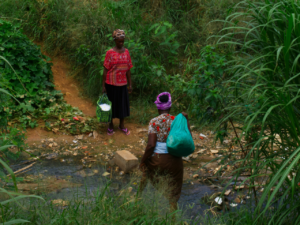Women and girl children are the hardest hit by lack of access to clean water and basic sanitation. This was said by Minister of Water and Sanitation, Ms Pemmy Majodina, at a Women in Leadership Dialogue held in Pretoria over the weekend.
The Minister was speaking at the dialogue hosted by the Department of Water and Sanitation for women in leadership positions in the department and its entities. The purpose of the event was to reflect on the strides made and the role women in leadership within the sector played in uplifting women, and in expanding access to basic services, especially water and sanitation. Minister Majodina, noted that while significant strides have been made to empower women and promote gender equality since 1994, “the stark reality is that the majority of people living in conditions of poverty are women and the poorest households are headed by women. They are the hardest hit by lack of access to clean water”.“Collecting water by carrying 25 litres on the head or pushing wheelbarrows while pregnant can cause health complications. Giving birth in a setting without safe drinking water or sanitation poses a serious risk for the survival of both mother and child”.Minister Majodina noted that lack of access to water and sanitation at home and school impacts negatively on girl children. They have to spend time collecting water or finding a safe place to relief themselves in the open.
“If there is no water and sanitation facilities, women dignity and self-esteem are affected. Women are also vulnerable to harassment and violence when they have to travel long distances to fetch water, use shared toilets or relief themselves in unsafe places”. She emphasised that as women leaders in the sector, they understand the negative impact of lack of water and sanitation much better and are well-positioned to make a difference.
She reminded women leaders in the Department of Water and Sanitation and its entities that the Constitution guarantees access to water and basic sanitation as a fundamental human right. She challenged them to ensure that the rights enshrined in the Constitution, especially the Bill of Rights, are translated into lived experiences of all women of South Africa. “Let our programmes and practices be inspired by the values and vision of a truly equal and non-sexist society. Let us ensure that a gender perspective permeates all decision-making processes and programmes of the department”, she said. Internally, Minister called on the Director General and the senior leadership of the department to ensure that the department and its entities create a conducive environment for women employees to work and thrive. “They carry a responsibility to ensure that the department becomes a safe space for women where their rights are promoted and protected”.






